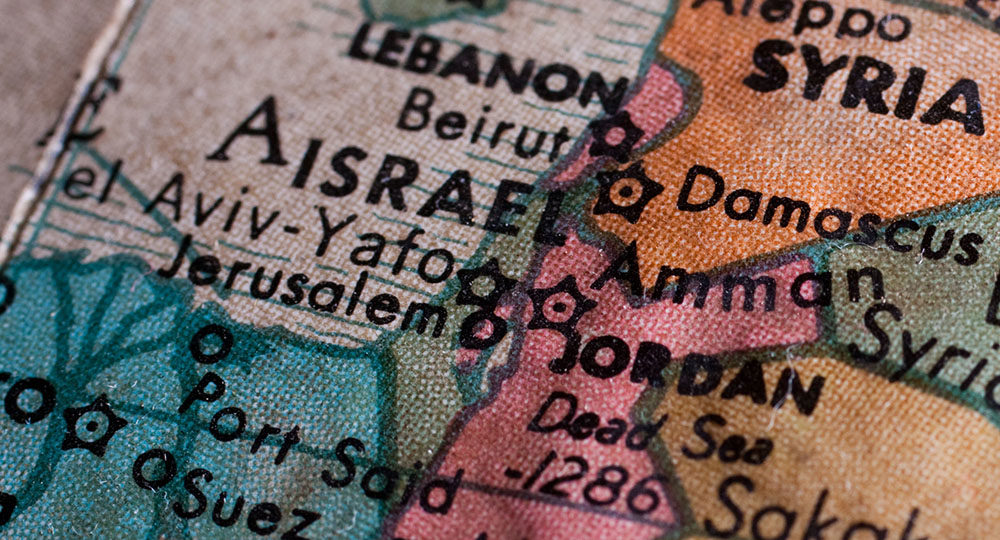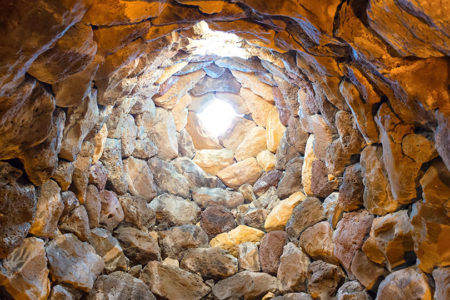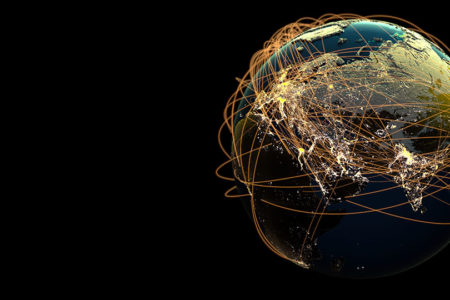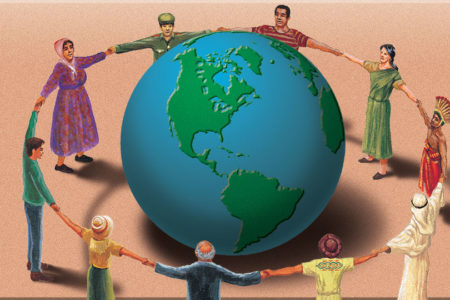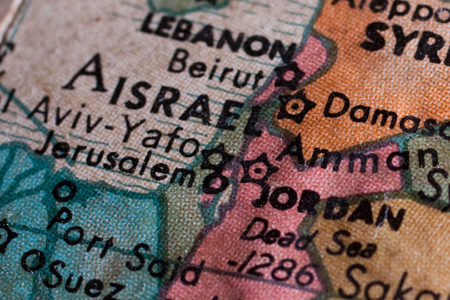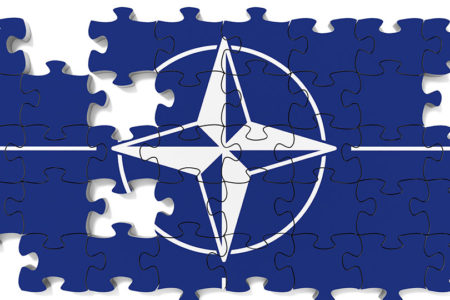Israel at the Epicenter
The Bible reveals that the God of the universe chose to establish His earthly throne at the physical center of the world. This disclosure was made through the great Jewish prophet Ezekiel: “Thus saith the Lord GOD: This is Jerusalem; I have set her in the midst of the nations and countries that are round about her” (Ezek. 5:5). Widespread belief that Jerusalem is truly situated at the geographical heart of the planet is even reflected in the common term for the region, Middle East.
Spiritually speaking, the holy city also lies at the apex of many people’s religious affections. No fewer than three faiths regard Jerusalem as sacred. More than two billion self-professing Christians—from the Philippines to Argentina, from Siberia to South Africa, indeed from virtually every nation on Earth— gaze toward Earth’s central city with reverent eyes. More than one billion Muslims also hold Jerusalem in high esteem, even though their primary hallowed sites are in nearby Saudi Arabia. And although the Jewish people are far fewer in number, they undeniably look to the Old City’s Temple Mount as the earthly center of their faith, as they have done for more than 3,000 years.
Consequently, Jerusalem is sacred to around half the people on earth. This fact alone helps explain why Israel’s growing capital city has now become the lightning rod of world media attention and the future address of Earth’s final conflict.
The Battle for Jerusalem
During the twentieth century, two countries nearly brought the rival superpowers to the brink of a devastating nuclear war. One of them was the small Communist island-nation of Cuba. The other was the even tinier country of Israel. (As small as Cuba is, it is still around five times larger than the Jewish state.) Anyone who even occasionally studies the Bible should not be surprised that Israel has become such a flash point. After all, both the Old and New Testaments foretold that the Promised Land would be the focal point for the climactic battle of history that would usher in the Messiah’s earthly reign.
After I moved to Israel from America in 1980, it took me a few years to figure out why this semiarid country is such an international hot spot. I already understood its importance to the three faiths named above and realized that regional oil supplies amounted to the lifeblood of the world economy. Still, these facts alone did not seem to explain why Jerusalem, of all places, was so controversial.
The Islamic world’s fixation with the city particularly puzzled me since Islam’s holy book, the Quran, does not mention Jerusalem even once by name. Everyone surely realizes that Mecca is, well, their Mecca. And the holy town of Medina, where their revered prophet Muhammad is buried, is clearly more important as well. Why then do so many Muslims seem to get so worked up over a place that is obviously not their primary holy site?
After living in Jerusalem for several years and talking to hundreds of Muslims, it finally dawned on me. This is the place on earth—not Mecca or Medina—where they believe that Islam demonstrated, for all the world to see, that it is “the final revelation of truth.” It was here, in the city I have called home since the 1980s, that the Islamic faith affirmed its self-professed superiority over Judaism and Christianity. Indeed, the Muslims believe that their military conquest of Jerusalem in A.D. 637 was the ultimate testament that their religion is true and the other two faiths flawed, as the Quran insists is the case. Surely, they say, it was none other than Allah himself who delivered the holiest city of both older faiths into their anxious, jihad-stained hands!
If capturing Jerusalem testified to the veracity of their faith, what did losing it to the “Christian” Crusaders say? It was a horrendous humiliation. Many contemporary Mideast Muslims still talk about the relatively brief conquest as if it occurred last week. If a Crusader Jerusalem was unbearable, what about a reborn Jewish state? Unthinkable, unimaginable, impossible.
So they thought until 1948.
Local Arab Muslims have long called Israel’s incredible reappearance on the modern world stage—in the face of an all-out military attempt by several Arab states to prevent it— al-Nakba, “the catastrophe.”
There was but one consolation after the swirling dust of battle finally settled. Sanctified Islamic clerics still ruled over most of the holy sites that the ancient Muslims had long ago “adopted” from Judaism and Christianity, such as Joseph’s tomb in Nablus; the tomb of the patriarchs and matriarchs in Hebron; and, most important, the Haram al-Sharif, or “Noble Sanctuary,” on Jerusalem’s holy Mount Moriah.
The Conflict Continues
Such, at least, was the case until the same coalition of Arab states went to war against the struggling “Zionist entity” in 1967. If the earlier war was a catastrophe, then the Six-Day War was an unspeakable desolation. The hallowed Haram was in despised Jewish hands! So, too, were many other Promised Land sites that had long been under exclusive Islamic control.
It was the burning Islamic need to retrieve the eastern half of Jerusalem that propelled Arab nations to launch a surprise attack on Israel on Yom Kippur in 1973. With full Soviet backing, the Arabs thought they might just succeed. Compared to their Six-Day War rout, they came remarkably close to achieving their goal. But Israel’s rumored nuclear arsenal gave the Kremlin pause. Meanwhile, in America, President Richard Nixon reversed his initial passive stance and began resupplying the besieged Jewish state, which again emerged victorious—if badly bruised.
Still, the desire to retake Jerusalem for Allah never disappeared in the years following the fierce Yom Kippur War. Egyptian President Anwar Sadat, when making peace with Israel at Camp David, insisted that negotiations include the Muslim world’s unwavering demand for an Israeli handover of “occupied Arab east Jerusalem.” Although the explosive issue was not even remotely resolved at the picturesque Maryland retreat, Sadat insisted that he would never sign any peace pact that did not include an Israeli promise to deal with the issue in the future.
The 1978 Camp David Accord succeeded in kicking the volatile Jerusalem issue into the stratosphere. But it was bound to come crashing back to earth one day. That day came fifteen years later on the White House lawn, where Israel’s Yitzhak Rabin signed a preliminary peace accord with Palestine Liberation Organization Chairman Yasser Arafat. As part of the accord—and to the utter astonishment of many Israelis—Rabin formally agreed to negotiate the “final status” of Jerusalem. The combustible issue had landed like a thud on the negotiating table.
More than seven years later, it became clear to all that the Oslo peace process would not succeed in satisfying Muslim aspirations regarding Jerusalem. Once more at Camp David, but with a different American president and Arab and Israeli leaders, Bill Clinton oversaw many long days and nights of intense negotiations to reach a “final status” accord. But the talks broke down last July over the stumbling stone of Jerusalem, with Arafat demanding complete sovereignty over the Temple Mount or no deal. Israeli Prime Minister Ehud Barak offered him everything but full sovereignty over the holy hill, including actual hands-on control of the site. (The Muslims actually have always run things there during Israel’s nearly 34-year rule of the Old City, although they don’t control the access gates to it.)
The New Palestinian Uprising
On September 27 last year, the new Palestinian uprising began. The Arabs immediately dubbed it the “Al-Aqsa intifada.” Unlike the first uprising that ended almost ten years ago, the goal this time was to wrest control of Jerusalem and especially of the Temple Mount. The aging Arafat said that the violence would stop only when Jerusalem became the capital of his independent Palestinian state “whether Israel likes it or not.” With uncharacteristic candor, he added that anyone who opposed his intentions to set up his throne in Jerusalem “can go to hell.”
One had to wonder if it wasn’t the evil ruler of that fiery domain who actually inspired Arafat’s political demand. After all, it was Satan’s eternal opponent—the God of Israel—who foretold, through His ancient Hebrew prophets, that He would restore control over Jerusalem to His dispersed Jewish people in the last days of human history. That restoration, says the Bible, will be the sign of all signs that the Messiah is on His way back to the Mount of Olives from where He ascended to heaven almost 2,000 years ago. Satan cannot be pleased that God continues to bring back His scattered Jewish people to their homeland at the center of the world.
The Final Showdown
The new Palestinian uprising thrust Israel again into the international spotlight. The world media have flocked to Jerusalem like a gaggle of geese to join those of us who are stationed here permanently. Even the American presidential candidates were suddenly forced to talk about something other than their domestic agendas. The price of oil shot way up, and world stock markets went sharply down.
Everyone realized that this new/old conflict at the center of the globe had the potential to turn extremely ugly, boding ill for the future stability of the world.
At worst, the unstable Middle East is again heading for a major bust-up. This alarming prospect became more probable after Arab leaders—holding their first summit meeting in more than four years—termed Israeli leaders “war criminals” and urged each other to downgrade or cut diplomatic ties with the Jewish state. Meanwhile, Iraq’s brutal dictator has called on all Islamic countries to support the new Palestinian uprising by joining him in a “holy war to liberate Jerusalem.” Iran, Yemen, and Libya have pledged to do so; and Syria has indicated it is leaning in the same direction.
Despite what takes place in the coming months, we can safely say that we are not about to witness the final showdown of history, the battle of Armageddon. According to the Scriptures, many things must still occur before that climactic conflict unfolds. Still, a close examination of current events here in the Middle East can only lead to the momentous conclusion that the prophesied end of the age is indeed drawing near.
One thing is indisputable: Israel will remain at or near the epicenter of world attention until the King of the Jews, the Messiah Jesus, returns to Jerusalem to rule from His glorious throne!
